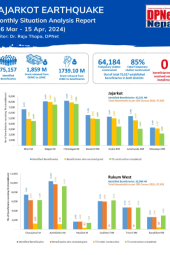Jajarkot Earthquake: Monthly Situation Analysis Report (16 March- 15 April, 2024)
Summary
This monthly report is prepared from an intensive field visit by the DPNet Team. The team, comprising Dr. Raju Thapa, Chairperson of DPNet, Immediate Past Chairperson of DPNet Mr. Surya Bahadur Thapa, and DPNet Advisor and Former Secretary Mr. Kedar Neupane, visited the field in the third and fourth weeks of March with the support from WHH. During the visit, several issues related to post-earthquake recovery in Jajarkot and West Rukum were observed and documented.
A primary concern highlighted was the slow pace of temporary shelter construction, exacerbated by the delay in the disbursement of the second installment of aid. Despite initial rapid distribution of the first installment to facilitate immediate relief, the requirement for extensive documentation for the second installment has led to significant delays. This situation has been further complicated by the inflated number of beneficiaries reported by local governments, possibly due to political influences, which has stalled the process and left many residents in precarious financial and living conditions. The report also noted the misrepresentation of household data has not only delayed the aid distribution but also raised questions about the integrity of the process. Local governments have been slow in updating beneficiary data on the Bipad portal, essential for releasing the second installment, with only Bheri Municipality showing efficiency in this regard.
Another issue discussed was the physical and material inadequacies of the temporary shelters. Many shelters, constructed quickly with materials like zinc sheets, fail to provide adequate protection from the heat and cold, leading to discomfort and health risks for the inhabitants. The design and size of these shelters do not accommodate larger families or consider the local geographical and environmental conditions, which has significant implications for the residents' quality of life. Moreover, the approach to aid has been criticized for not considering the unique needs of the most vulnerable populations. The senior citizen and people with disability, unable to participate actively in rebuilding their homes, have faced additional challenges. The report calls for a more inclusive approach to aid distribution that considers individual needs and capabilities, suggesting that aid be tailored rather than uniform.
The report also touches on broader socio-political and environmental challenges affecting the recovery process. Issues such as the environmental impact of increased timber demand due to reconstruction, and the need for better disaster preparedness and resilient building practices were discussed. The community's resilience is being tested, not only by their immediate recovery needs but also by the broader implications of rebuilding efforts that must consider future sustainability and disaster preparedness.
Categories:
DPNet Publication
Sub-Categories:
Situation Analysis Report
Writer:
Dr. Raju Thapa
Published Year:
2024
